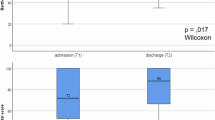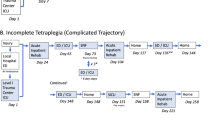Abstract
We have brought out various factors relating to the psychological and social reactions to acute spinal paralysis. It is felt that all medical, nursing and other members of the staff should be properly trained and knowledgeable in these aspects of spinal paralysis, as the initial management of such patients—and this also includes the management of the patient's family—will determine the success of subsequent management. We believe that rehabilitation begins from the time of onset of the paralysis and certainly from the time of arrival of the patient in hospital.
Although we realise that the basic pattern of human behaviour is more or less the same everywhere, we are exploring the influence of ethnical differences and different social and cultural influences in different parts of the world on the psychological and social reactions to acute spinal paralysis. Finally, we would stress again the importance of a first-class Spinal Paralysis Service for all patients and proper education of all involved with them, including doctors—specialists and GPs—and all members of the important ancillary and supporting specialties.
Similar content being viewed by others
Log in or create a free account to read this content
Gain free access to this article, as well as selected content from this journal and more on nature.com
or
References
Gunther, M S (1969). Spinal Cord Injuries. Ed. David Ruge. pp. 93. U.S.A.: Charles C. Thomas.
Harris, P (1967). Paraplegia, V, 132.
Naughton, J A L (1963). Spinal Injuries. Ed. Phillip Harris. Pp. 135. Royal College of Surgeons of Edinburgh.
Zubek, J P (1964). British Medical Bulletin, 20, 38.
Author information
Authors and Affiliations
Rights and permissions
About this article
Cite this article
Harris, P., Patel, S., Greer, W. et al. Psychological and social reactions to acute spinal paralysis. Spinal Cord 11, 132–136 (1973). https://doi.org/10.1038/sc.1973.16
Issue date:
DOI: https://doi.org/10.1038/sc.1973.16



